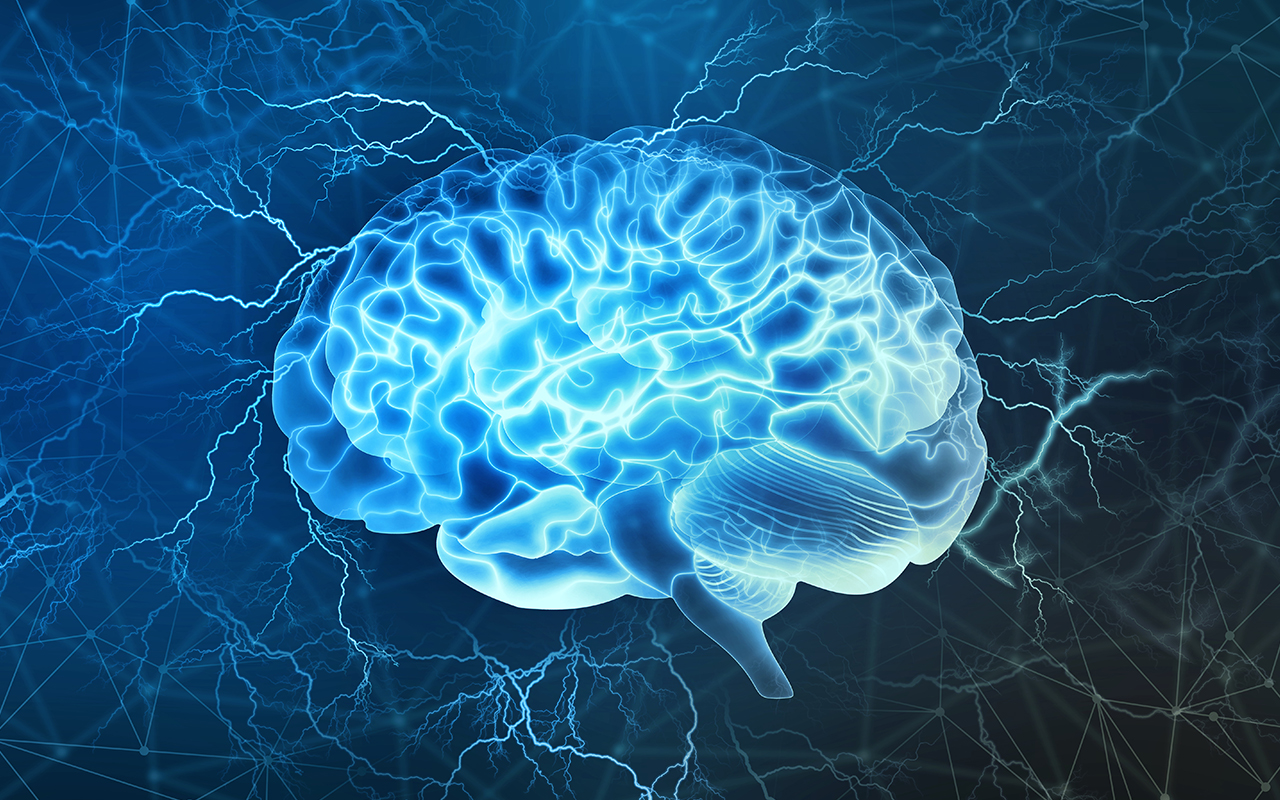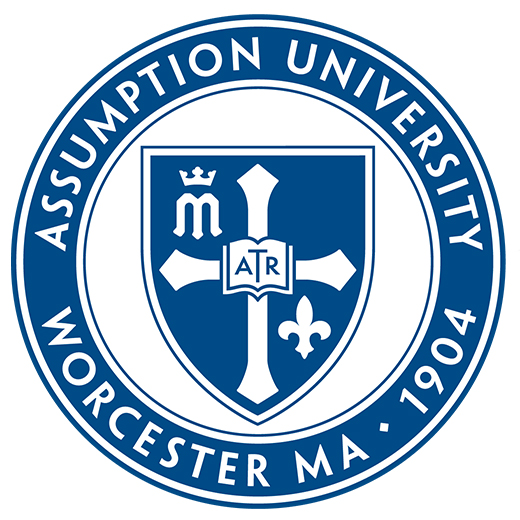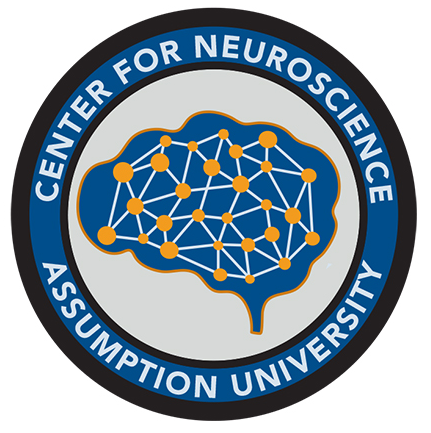 | The Center provides enriching avenues for experiential learning within the interdisciplinary field of neuroscience. These opportunities include paid summer research internships, a neuroscience seminar series, co-curricular activities, and community outreach. The Center also sponsors career networking events and supports Assumption’s Chapter of the National Neuroscience Honor Society, Nu Rho Psi, and the student-led neuroscience club. This important work aligns with the University’s mission to awaken the sense of wonder, discovery, and purpose, while developing skills as lifelong learners in the context of a liberal arts curriculum in the Catholic tradition. |
Student Neuroscience Research
-
Mentor: Dr. Nikos Lessios
Paige carried out research on the behavioral responses of branchiopod crustaceans to ultraviolet light. Despite ultraviolet light being attenuated rapidly in their environments with depth, results so far indicate one species of branchiopod crustacean, Triops longicaudatus, moves towards ultraviolet light. Paige expanded this research to look at a separate species of crustacean, Streptocephalus mackinii, and asked if they also moved towards ultraviolet light and how this differed at other wavelengths. Her data suggest that S. mackini move towards low intensity light when presented with a broad wavelength distribution ranging from the ultraviolet through the visible wavelengths. However, these positive responses were not found to narrow spectrum ultraviolet light. Together, these results indicate that while Triops longicaudatus may use a single ultraviolet photoreceptor, Streptocephalus mackini is likely sensing and responding differently to broad spectrum light that includes ultraviolet light, potentially including a color comparison from multiple spectral photoreceptor classes.
-
Mentor: Dr. Hannah Smith
Have you ever heard of computational thinking? Maybe so, but if not, this could be because of the current educational landscape surrounding computational thinking (CT). CT consists of various skills such as abstraction, algorithmic thinking, debugging, and sequencing. These skills are rising in importance as STEM education becomes more popular and more jobs rely on computational skills. However, there is no agreed-upon definition, which makes it hard for teachers, policymakers and students to incorporate into education. There also exist gender and technology biases making it difficult to provide opportunities for developing CT skills to all. This research explores student responses to eight vignettes (short story examples), designed to be CT examples or not. Students responded whether they thought examples were or were not representative of CT and to explain their answer briefly. We conducted both quantitative and qualitative analyses of the responses, finding that students with prior programming experience used more CT concepts in their answer explanations than those without prior programming experience. However, all students answered similarly in deciding if the example represented CT or not. This work, combining concepts from psychology, computer science, education, and learning sciences, provides an important foundation for exploring student perceptions of CT in an ultimate effort to increase access to quality CT curricula.
-
Mentor: Dr. Leamarie Gordon
During the summer of 2024, Danny Portillo ’25, a psychology major with a concentration in mental health and pre-clinical counseling worked under the mentorship of Prof. Leamarie Gordon on a project focusing on retrieval practice, an evidence-based approach to learning and memorizing new information by answering practice questions. The goal of the project is to examine whether retrieval practice can help individuals learn about negative thinking patterns, known as cognitive distortions, and how avoid giving in to faulty thoughts. Over the summer, Danny researched and selected study materials, finalized retrieval practice stimuli, programmed the study into survey software, and obtained research approval from the IRB. Danny will begin data collection for the study during the fall of 2024.
-
Mentor: Dr. Karen Lionell-Denolf
Funding: Center for Neuroscience
Research time period: summer 2023 and fall 2023 as Honor’s thesis
Post-graduation plans: Currently a graduate student in Assumption’s School Counseling program
Products: Honors thesis, one internal poster presentation, two poster presentations at professional meetings
- Borge, S., & Lionello-DeNolf, K. M. (November, 2023). Academic cheating and stressors at the university level[Poster presentation]. 63rd annual meeting of the New England Psychological Association, Worcester, MA
- Borge, S., & Lionello-DeNolf, K. M. (April, 2024). Academic cheating and stressors at the university level [Poster presentation]. Annual Social Science and Policy Studies Undergraduate Research Showcase, WPI, Worcester, MA
-
Mentor: Dr. Michele Lemons
Funding: National Science Foundation grant awarded to Dr. Lemons
Research time period: Summer 2023
Post-graduation plans: Will begin Postbaccalaureate Research Education Program (PREP) at the University of Massachusetts Chan Medical School in summer 2024
Products: one presentation at Assumption, one poster presentation at the Society for Neuroscience Meeting
McKillop,H., Genao, N., Francis, M.M., Lemons, M.L. (2023) Investigating roles for extracellular matrix in neuronal synapse formation. Society for Neuroscience Meeting, Faculty for Undergraduate Research symposium. Washington, D.C.
-
Mentor: Dr. Michele Lemons
Funding: National Science Foundation grant awarded to Dr. Lemons
Research time period: Summer 2023 and Fall 2024 as Honor’s thesis
Post-graduation plans: Will begin PhD program at the University of Massachusetts Chan Medical School in Fall 2024
Products: honor’s thesis, two presentations at Assumption, poster presentation at the Society for Neuroscience Meeting
McKillop,H., Genao, N., Francis, M.M., Lemons, M.L. (2023) Investigating roles for extracellular matrix in neuronal synapse formation. Society for Neuroscience Meeting, Faculty for Undergraduate Research symposium. Washington, D.C.
Lemons, M.L., Oliver, D.B., Biswas, K., Russel, J., McKillop, H.E., Benard, C.B., Francis, M.M. (2023) Genetic Analysis of circuit connectivity identifies key processes important for the development and maturation of excitatory synaptic connections to GABAergic neurons. Genetics Society of America, International C. elegans Conference. Glasgow.
McKillop, H., O’Keefe, S., MacQuarrie, L., Francis, M.M., Lemons, M.L. (2022). Investigating Roles of the Extracellular Matrix in Synapse Formation. Society for Neuroscience Meeting, Abstract Control # 10425.
-
Mentor: Professor Anthony Sacino
Funding: Biological and Physical Sciences Department
Research time period: summer 2024 and fall 2024
Post-graduation plans: laboratory technician at LGC Standards in New Hampshire
Products: earned authorship on poster presentation at the Society for Neuroscience Meeting that will be held in November 2024. Tentative title of poster: Sex Differences in Mice During Nicotine Self Administration
-
Mentor: Dr. Nikos Lessios
Funding: Center for Neuroscience
Research time period: summer 2023
Post-graduation plans: enrolled in Fordham University’s Pre-Health/Biomedical Sciences program, also working as a Patient Care Associate (PCA) at St. Francis Hospital to gain clinical hours before applying to PA school next cycle.
Products: one internal presentation and three poster presentations at professional meetings
- a) B. Stevens, N. Lessios. Tadpole and fairy shrimp responses to narrow spectrum ultraviolet light and broad spectrum light. Society for Integrative and Comparative Biology Annual Meeting, Seattle, WA, January 2024.
- b) B. Stevens, N. Lessios. Phototaxis behavior of tadpole and fairy shrimp crustaceans in response to UV and broad spectrum light stimuli. Animal Behavior Society, July 2023
- c) B. Stevens, P. Huffman, M. Gaughan, and N. Lessios. Branchiopod crustacean behavioral responses to visible and UV light: are there neural implications? Animal Behavior Society, London, Canada, June 2024
Faculty Neuroscience Research
-
Rutowski, R. L., Lessios, N., Seymoure, B., Pegram, K. V., & Raymundo, A*. (2023). Male behavior in a swallowtail butterfly (Battus philenor) ensures directional iridescent sexual signal is visible to females during courtship. Behavioral Ecology and Sociobiology, 77(10), 112. https://doi.org/10.1007/s00265-023-03387-7
S.R. Cavanagh*, M.L. Lemons*., B.M. Dewsbury., J.R. Eyler,. L. Fergusson-Kolmes, J.M. Lang, H.L. Urry, L.B. Wheeler. Equitizing STEM Retention: Transforming Feedback and Grading in Undergraduate Biology Education (TUnE-Bio) Network. CBE LSE special issue: Equity, Inclusion, Access and Justice in Biology Education. Submitted February 2024. Under review.
* = co-first authors
S. Ramachandran, N. Banerjee, R. Bhattacharya, M.L. Lemons, J. Florman, C.M. Lambert, D. Touroutine, K.
Alexander L. Schoofs, M.J. Alkema, I. Beets, M.M. Francis. (2021) A conserved neuropeptide system links head and body motor circuits to enable adaptive behavior. Elife. Nov 12; 10:e71747. DOI: 10.7554/eLife.71747M.L. Lemons (2021) Phantom Limb Pain: Feeling Sensation From A Limb That Is No Longer Present And What It can Reveal About Our Brain Anatomy. The Journal of Undergraduate Neuroscience Education (JUNE). 19(2):C1-C11.
D. Oliver, E. Norman, H. Bates, R. Avard, M. Rettler, C.B. Benard, M.M. Francis, M.L. Lemons.(2019) Integrins Have Cell-Type-Specific Roles in Development of Motor Neuron Connectivity. Journal of Developmental Biology. 7(3), 17; https://doi.org/10.3390/jdb7030017.
A. Philbrook, S. Ramachandron, C.M. Lambert, D. Oliver, J. Florman, M.J. Alkema, M. Lemons, M.M. Francis. (2018) Neurexin directs partner-specific synaptic connectivity in C. elegans. Elife. Jul 24;7. pii: e35692. doi:
10.7554/eLife.35692. -
McKillop,H., Genao, N., Francis, M.M., Lemons, M.L. (2023) Investigating roles for extracellular matrix in neuronal synapse formation. Society for Neuroscience Meeting, Faculty for Undergraduate Research symposium. Washington, D.C. November.
Assessment, Feedback, & Grading in Introductory Biology: Current State of Play. Cavanagh, S.R., Eyler, J.E., Wheler, L., Lemons, M.L. (2023). 46th Annual Meeting of the Professional and Organizational Development Network in Higher Education. November, Pittsburgh, PA
Lemons, M.L., Oliver, D.B., Biswas, K., Russel, J., McKillop, H.E., Benard, C.B., Francis, M.M. (2023) Genetic Analysis of circuit connectivity identifies key processes important for the development and maturation of excitatory synaptic connections to GABAergic neurons. Genetics Society of America, International C. elegans Conference. Glasgow.
McKillop, H., O’Keefe, S., MacQuarrie, L., Francis, M.M., Lemons, M.L. (2022). Investigating Roles of the Extracellular Matrix in Synapse Formation. Society for Neuroscience Meeting, Abstract Control # 10425.
Grants Received
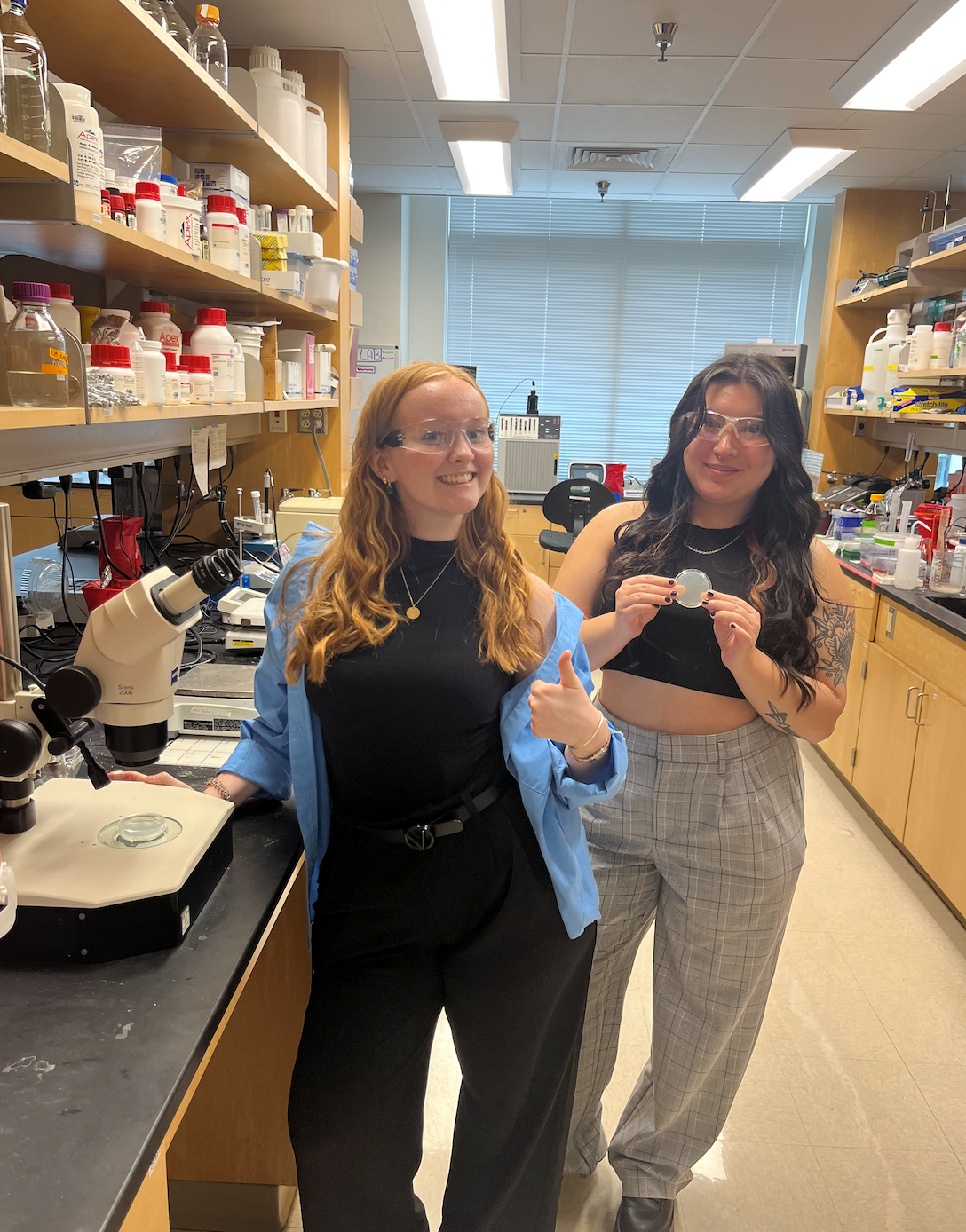
Madison and Claire working on their honors summer research fellowship.

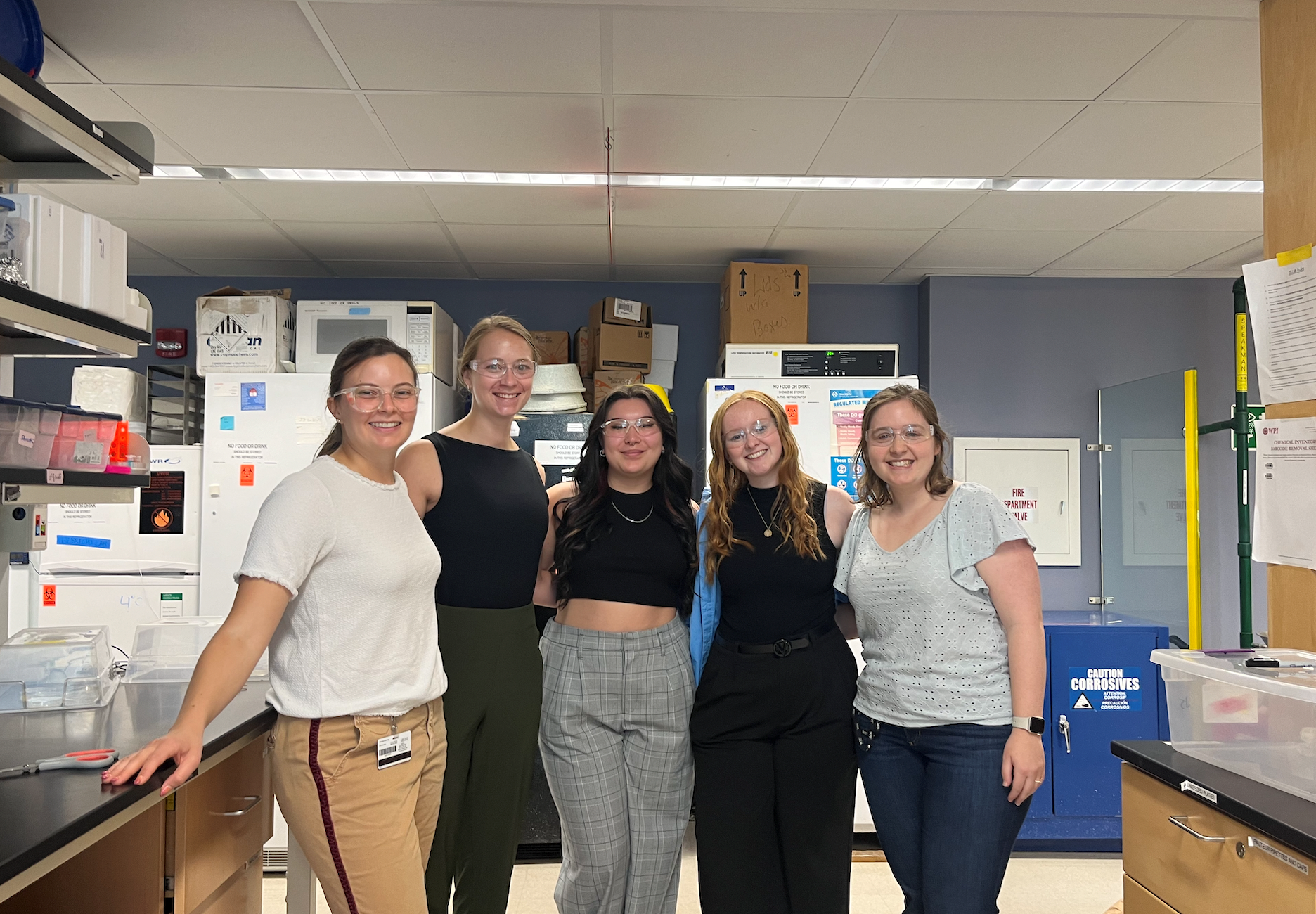
Summer 2024 research

Hailey McKillop and Noelia Genao present their data at the Society for Neuroscience Conference in Washington, D.C.
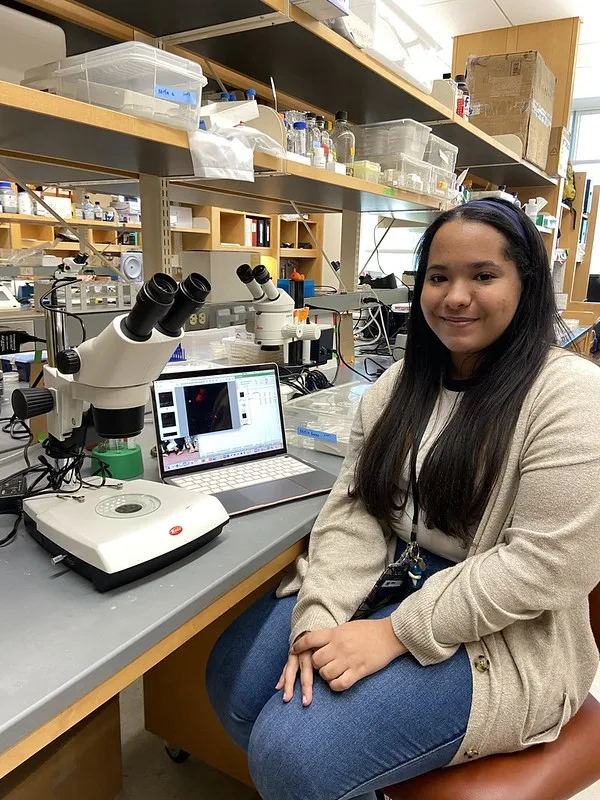
Noelia Ganao conducting research in the Dept of Neurobiology at UMCMS.
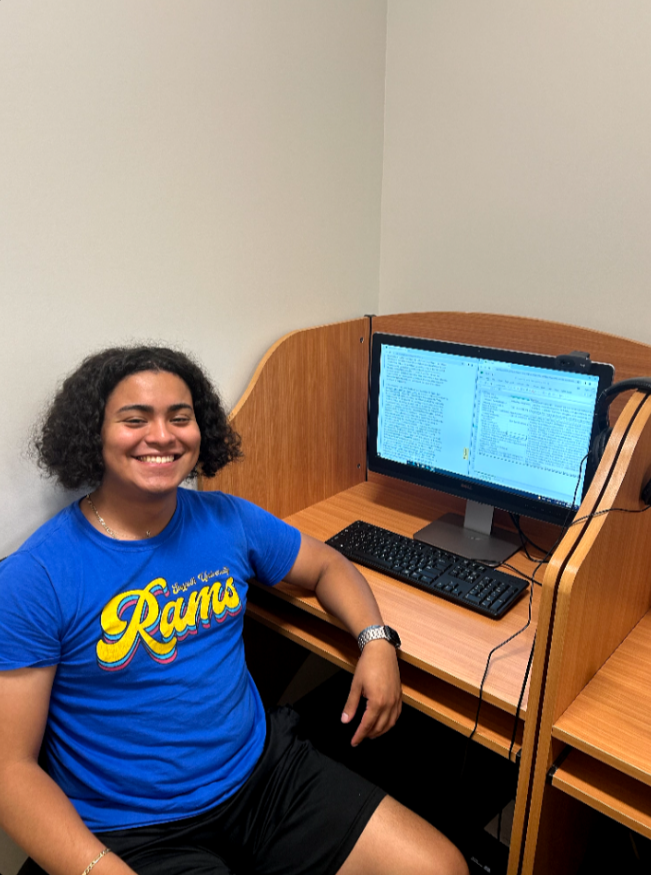
Danny Portillo ’25 in the Learning and Memory lab
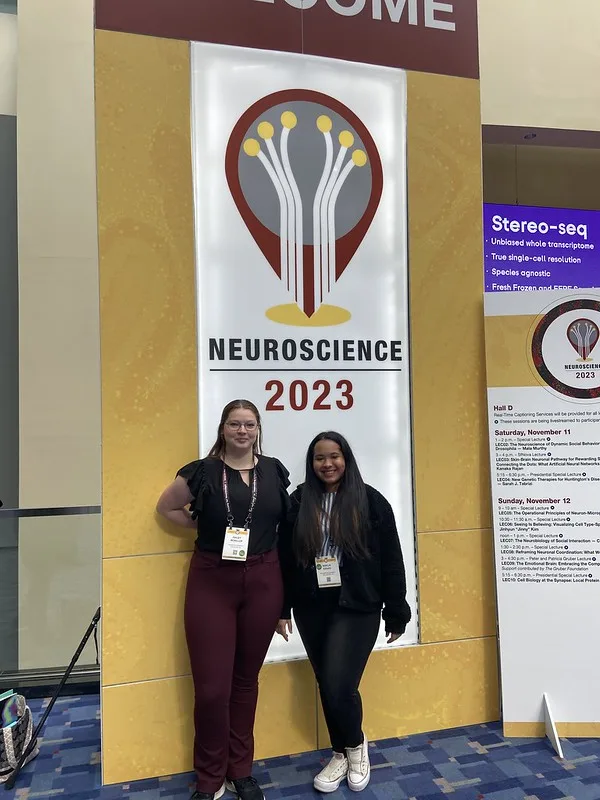

NU RHO PSI Induction Ceremony
Faculty
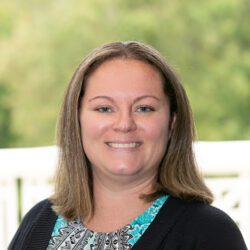
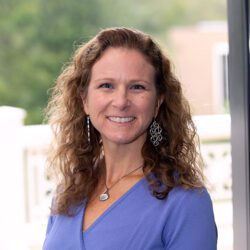
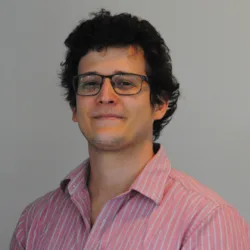
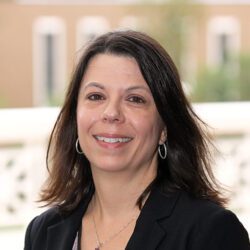
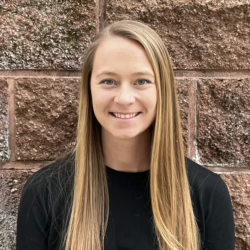
Center Initiatives
-
The Collaborative Accelerated Master’s Program allows Assumption students (not restricted to neuroscience majors) to apply to WPI’s Master’s in Neuroscience program while an Assumption undergraduate. Application fees and GRE requirements are waived by WPI for Assumption students. Accepted students can pursue a master’s degree in neuroscience at WPI in an accelerated time frame after completing their bachelor’s degree at Assumption. Currently enrolled Assumption undergraduates can earn graduate credit (up to 12 credits) towards a Master’s degree in Neuroscience at WPI by successfully completing a selected list of courses. These courses include undergraduate courses at Assumption and at WPI, in addition to a selected list of graduate level courses at WPI, at no additional cost beyond undergraduate Assumption tuition. This agreement allows Assumption undergraduates to complete a Master’s in Neuroscience at WPI in an accelerated manner, saving time and money.
-
The Center for Neuroscience proudly supports faculty-student research. This work is transformative for our students and unveils novel understanding about the brain. Names of recent and upcoming students, faculty mentors and home departments are listed below.
Summer 2023 Research supported by the Center for Neuroscience:
Sam Borge and Dr. Karen Lionell-Denolf, Psychology department
Brian Stevens and Dr. Nikos Lessios, BPS department
Summer 2024 Research supported by the Center for Neuroscience:
Paige Huffman and Dr. Nikos Lessios, BPS department
Danny Portillo and Dr. Lea Gordon, Psychology department
Madison Wells and Dr. Hannah Smith, Psychology department
-
The Center for Neuroscience sponsors a seminar series that highlights current findings in the highly interdisciplinary field of neuroscience to our students, faculty and staff. Each year, the Center invites at least three neuroscience researchers to Assumption’s campus to share their latest work with our community. Each speaker is strategically selected from at least three subdisciplines to highlight multidisciplinary approaches used within the field of neuroscience. For example, one speaker will offer an approach grounded in biology, one in psychology, and one in philosophy.
Neuroscience Seminar Speakers for the 2023-2024 Academic Year:
Dr. Kellie Alexander, Brigham and Women’s Hospital (Biology)
Dr. Joseph Cruz, Williams College (Philosophy)
Dr. Arielle Keller, University of Pennsylvania (Psychology)
Dr. Meltem Karaca, Boston University, VA Boston (Psychology)
-
The Director of the Center for Neuroscience is the faculty mentor for Assumption’s Zeta Chapter of the National Neuroscience Honor Society, Nu Rho Psi, and the faculty mentor for the student-led neuroscience club.
-
The Center provides you with opportunities to give back to the local community, through activities such as visits to local elementary schools and generating awareness of brain-related diseases by participating in community 5k runs/walks.
-
The Center for Neuroscience worked with the Assumption Science Collaborative, to plan and sponsor an event called, “Clarifying Careers”. We invited alumni (including neuroscience alumni) from the Biological and Physical Sciences Department to join current Assumption students at an informal dinner on campus. At this dinner, our alumni shared their experiences selecting and navigating various careers in the sciences. Dinner was followed by an informal Q&A session and dessert. This event was well attended, and our undergraduates reported that this event was incredibly helpful and insightful.
The Center worked with student members of the Neuroscience Club, Psychology club, Nu Rho Psi and Psi Chi (Psychology Honor Society) to raise awareness and support for persons afflicted with Multiple Sclerosis (MS). We participated in a National “WALK MS” event in April and also fundraised for this organization that supports persons with MS. We designed, ordered and distributed T-shirts that read, “Team Assumption, WALK MS” to our Assumption volunteers/walkers. We proudly wore these shirts at the walk, which was held at Worcester Technical High School on April 27 with more than 400 other walkers.
The Center for Neuroscience worked with student members of the Neuroscience Club and Nu Rho Psi (the National Neuroscience Honor Society) to plan several events in the Assumption community. We participated in “de-stress fest” at the end of the spring semester. This event, which is organized by Peers Advocating Wellness (PAWS), offers students a break from the stressful time immediately prior to the start of final exams. We contributed by planning and staffing a station that offered literature about importance of sleep, sleep masks, a sleep journal and squishy de-stress balls. We also offered an opportunity for students to color a “brain hat”, which created some good laughs (which also decreases stress).

